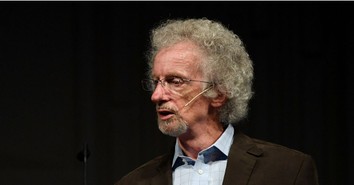Why Do People Say That All Christian Music Sounds the Same?

It’s not unusual to hear people complain that Christian music has lost its variety, that everything we hear in church or on Christian radio sounds the same.
We may wonder though: is this a valid critique? Does Christian music really all sound the same, and has that always been true?
To answer this question, we need to consider what we mean by Christian music, how it has changed as it has evolved into an industry, and whether there is anything we can do to encourage more variety in Christian music. Additionally, we need to reflect on how cultural trends and audience expectations shape the sound of Christian music. Most importantly, we should ask whether the heart of Christian music—glorifying God and edifying believers—is being upheld amid calls for more diversity.
Photo credit: Unsplash
Where Does Christian Music Really Come From?

Where Does Christian Music Really Come From?
SLIDE 1 OF 5
When most people mention “Christian music,” they mean music marketed by Christian companies (record labels, bookstores, and so on) as contemporary Christian music.
As books like God Gave Rock and Roll to You and documentaries like The Jesus Music discuss, contemporary Christian music was born from several factors in the early 1970s. A revival, eventually labeled the Jesus Movement, led to many young people joining American churches and shifting how those churches approached everything from dress codes to worship music styles. Rock and roll music went from being seen as sinful to being acceptable. Rock musicians like Larry Norman, Randy Stonehill, and Mylon LeFevre began recording and selling their music. Eventually, an industry built up to market this music to people through Christian radio.
As Daniel Silliman discusses in his book Reading Evangelicals, something else was happening in the 1970s: shopping malls helped to create a space for Christian bookstores that appealed to a wide group of Christians across denominations. The bookstores became not just a space to discover new genres of Christian books, but also to discover Christian music.
By the 1980s, there was a Christian music industry making Christian rock and pop music, and clear business pipelines for selling that music to Christian consumers through bookstores, concerts, and conferences. Obviously, not everyone who is a Christian produces music in that market. Currently one of the most acclaimed classical music composers in the world is a Christian: Estonian composer Arvo Pärt. But his music is very different from the gospel music of Andrae Crouch or the Christian rock of the Newsboys or even the hymns of Keith and Kristen Getty.
Having established what Christian music means, does it really all sound the same?
Photo credit: ©GettyImages/Maskot
Does All Christian Music Really Sound the Same?

Does All Christian Music Really Sound the Same?
SLIDE 2 OF 5
The short answer is yes and no.
Yes, much music that we hear on Christian radio, music streaming services, or church events tends to sound alike.
Partly, that is rooted in how we listen to Christian music today. As music has become more digital than physical, it has become harder to experience new genres of music. Digital tools we use, like Internet searching or music apps, use algorithms to recommend new music to us. In other words, we ask computers for suggestions, and they make calculated guesses based on what we’ve already listened to or what people with similar habits (who buy similar things online, etc.) listen to. Digital tools are great at helping us find Christian music that sounds like what we already listen to. However, they cannot make intuitive guesses to truly surprise us and suggest something entirely new.
There is also the fact that Christian music has changed a lot since it began in the 1970s, sometimes becoming blander. How did this happen?
Photo credit: ©GettyImages/MangoStar_Studio
When Did Christian Music All Start Sounding the Same?

When Did Christian Music All Start Sounding the Same?
SLIDE 3 OF 5
Every industry goes from an early experimentation period to adjust its focus toward what makes the most money or can be most easily marketed to the most people. Innovators become part of the establishment. The second decade of Christian music experienced that change in a big way. America in the 1970s experienced many messy crises, from Watergate to Vietnam, but that messiness also invited people to challenge culture. The 1980s was the Ronald Reagan era, known for its social conservatism as many Americans sought better paychecks and greater stability.
The cultural shift had big consequences. The first generation of people making contemporary Christian music were mostly former hippies still aiming to challenge culture with their music, just in a Christian way. The next generation was less interested in being countercultural and more interested in making a living in a big market where saying challenging things in their songs could mean losing money.
A related problem, which musicians like Michael Card have highlighted, is that the average Christian’s familiarity with classic hymns and other traditional church music decreased. The more musicians know older music forms, the more resources they can draw on to produce work that doesn’t sound like the current market. The longer contemporary Christian music has existed, the easier it has become to build a musical education that only covers recent music, and the harder it becomes to make something different.
This does not mean that all Christian music became bland in the 1980s. Christian metal bands like Stryper appeared, making enough money to survive by working between secular and Christian music markets. In the 1990s, musicians like dc Talk introduced Christian rap. But, as Rich Mullins liked to remind people at his concerts, Christian music is an industry producing entertainment for money. Up-and-coming industries take big risks, but doing challenging things (like Mullins’ musical about Francis of Assisi that sets the story in the Civil War) requires risks that most people in a large industry will not take.
As the 1980s continued, musicians who wanted to write about spiritual themes without relying too much on Christian radio, like Canadian musician Bruce Cockburn, found ways to market themselves on mainstream radio. Many times they worked together: albums produced by T-Bone Burnett might feature Cockburn alongside Sam Phillips, Mark Heard, or Michael Been (sometimes with his band The Call). Other musicians, like the band Luxury, performed in small music festivals and church basement concerts, a kind of Christian rock underground scene. Joseph M. Keegin describes how this underground rock scene even included punk bands with names like As I Lay Dying.
There was variety in small places. However, what the average listener heard on Christian radio or saw on sale in Christian bookstores started to all sound the same. The complaints that Christian music had gotten boring had arrived.
Of course, the 1980s-1990s was a while ago. Has Christian music evolved since then?
Photo credit: Unsplash
Does Christian Music Really All Sound the Same Today?

Does Christian Music Really All Sound the Same Today?
SLIDE 4 OF 5
Today, Christian music can feel both blander and more exciting than ever.
On the one hand, the Internet means that people have many more avenues to learn about music and don’t feel as obligated to build their idea of “Christian music” from what their church likes or their local Christian radio station plays.
Making independent music that doesn’t sound like “the same old Christian music” has never been easier. When Mark Heard decided to produce his own music in the 1980s, he converted an ice cream truck into a recording studio, paid people to manufacture CDs from his recordings, and advertised the CDs through newspapers. Today, few people need that many steps to produce music. Anyone with a laptop can buy or download tools to do most of the work and use websites like Kickstarter to raise money to cover the costs. Up-and-coming bands like The Grey Havens or Gable Price and Friends have successfully gone from fundraising their first records to getting contracts with record companies. Successful musicians seeking a new sound, like dcTalk member Kevin Max, have used online fundraising to produce their own music.
On the other hand, just because anyone can put their music online does not mean everyone can make money doing it. Streaming services often pay tiny amounts unless musicians get hundreds of thousands of listeners per month. The fact the music is “somewhere on the Internet” does not guarantee that listeners will discover the music. Musicians still must find ways to market their work to the right online communities that will appreciate it.
Some musicians handle these challenges by collaborating with other local musicians who complement their skills and have their own communities to promote the songs. Jim Spiegel releases music he records himself through YouTube, but he has also produced music with artists Luxcia and Hookville.
Some musicians take that process further and make their music part of a multimedia collaboration. Matthew Clark’s album Only the Lover Sings was the first of three albums based on the story of the Samaritan woman at the well. He worked with Christian authors he knew to produce three accompanying books exploring the biblical story’s themes.
So, depending on what you consider Christian music (what’s on the radio, what you find on YouTube, or what someone recommends on a message board), finding unique Christian music can be a challenge.
Photo credit: ©Getty Images/Kara Gebhardt
How Do We Find Christian Music That Does Not All Sound the Same?

How Do We Find Christian Music That Does Not All Sound the Same?
SLIDE 5 OF 5
As mentioned earlier, the way digital tech leads us into little digital silos where we get more of what we already have makes it hard to find new music. Fortunately, we can challenge that problem in several ways.
First, we can look to our family—biological and spiritual. We can ask siblings, parents, or other relatives what music they listen to or recommend. They may have music tastes we do not expect. They may come from different cultures and generations that gave them access to musical subcultures we may not know about. The cousin we thought only listened to John Michael Talbot and Amy Grant may also like Steve Taylor of Chagall Guevera or Lecrae.
We should also look to the church—the one we attend on Sundays, or a community of believers who give us spiritual advice. Worship leaders may know good bands worth listening to. Someone in the next pew may produce music in their basement or know local bands worth hearing. Maybe they know about Christian music we would not expect, like rock operas or musicals.
Second, we can look into musicians in our area. Maybe a Christian artist’s community holds open mic nights. Maybe the local library has a recording studio that local bands use. The more people we connect with, the more we can discover varieties of music we would never discover alone.
Third, we can support musicians we discover by finding their online presence. If they are a local musician who does their own recording and production work, they probably have a website where people can donate monthly to support their work for free music or other rewards. Maybe they have a fundraising campaign for a new album that we can help turn from a dream into reality.
Looking for new music online may seem like the first step instead of the third, but it works best if it comes after making personal connections. We have a lot of facts we can learn about music and faith, but we are not designed to be alone. We are hardwired to relate to other people—not just husbands and wives relating to each other (Genesis 2:24-25), but couples and single people all relating to each other as fellow Christians in the church. There is a reason that verses like Hebrews 10:25 remind us not to neglect meeting together or that chapters like 1 Corinthians 12 tell us we belong to a body with many members. We become saved by individually going to Christ and seeking salvation, but then we are called into a body of believers that helps us grow. At its best, the church is a garden for producing spiritual growth, and creative growth by helping us find good art that feeds our souls.
Finding Christian music that doesn’t all sound the same may be challenging, but not impossible. If we consider what Christian music really is, and how to pursue it Christianly in community.
For more on discovering unexpected Christian music, check out these articles:
Jesus Movement Christian Pioneers You Didn’t Know About
Christian Rock Bands that Are Under the Radar
How Did Andrae Crouch Revolutionize Christian Music?
Christian Music and Videos on Crosswalk.com
Photo credit: ©Getty Images/ shuang paul wang

Originally published January 13, 2025.









